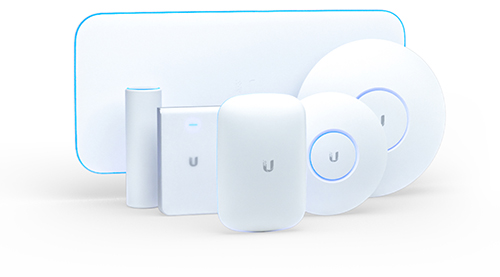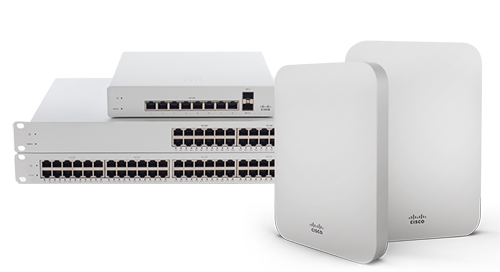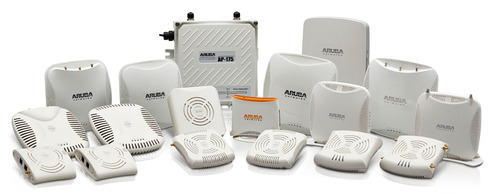Nowadays, there are more and more wireless vendors in the market. How to choose the right wireless products is a question for every enterprise. Today in this post, you can find the differences among Ubiquiti Network (UBNT), Meraki (a Cisco’s sub-brand) and Aruba (a company of HPE), and find the right one for your wireless network deployment.
Ubiquiti Network Wireless Products
UBNT Wireless networking solutions provide various products including UBNT Access Points, wireless controllers, antennas and wireless bridge, etc. for various needs.

Meraki Wireless Products
Cisco Meraki MR series delivers WiFi 6 AP, faster AP deployment, simplified administration, and richer visibility.

Aruba Wireless Products
Aruba Access Points deliver fast, reliable Wi-Fi performance, boost network efficiency, and support the growing mobile and IoT density demands on your network.

Ubiquiti vs Meraki vs Aruba
This table shows the comparison.
| Brands | Ubiquiti | Meraki | Aruba |
| Products | |||
| Breadth of Product Portfolio | Offers all needed wireless, wired, management and security products for a complete enterprise network | Offers all needed wireless, wired, management and security products for a complete network solution | Offers most needed wireless, wired, management and security products for a complete network solution |
| SMB Solutions | Easy to deploy and use Both cloud (US) and on-premises available Feature-rich, all features included One intuitive UI handles everything No SW licensing fees Colorado Factory user story Mid-Sized Church in Florida user story Unbeatable value | Easy to deploy and use Product is useless if subscription fees are not paid Need to pre-pay and commit to several years if want better pricing Good product for SMB, except it’s very expensive
| HW Controller based products difficult to deploy and use Instant APs lack features without separate Aruba Central or AirWave license Aruba Central offers a good cloud product for SMB, except its very expensive |
| Enterprise Solutions | Easy to deploy and use All-in-one management; All APs, switches and routers in one UI Central management and troubleshooting capabilities Low learning curve for network admin, no vendor certifications necessary Cloud and on-premises available Very high AP performance No HW controller as a bottleneck Good HD Wi-Fi control capabilities (cell size, data rates, power) Central Coast Grammar School case study British Armed Forces case study | Easy to deploy and use cloud architecture No on-premises alternative Performance lacking at higher traffic loads Product is useless if annual subscription fees are not paid Expensive ongoing licensing Need to pre-pay and commit to several years if want better pricing
| Large configurations can handle large networks Base product is traditional single tenant HW controller, which makes product difficult to deploy and use For sufficient reliability need redundant controllers ($$) Instant AP not sufficient for larger facilities or multisite Aruba Central provides a cloud alternative Central uses separate licenses for features. New future functionalities may require additional licenses which makes it very expensive Handling and renewing expiring licenses or adding new devices is time-consuming. |
| Arena/Stadium Solutions | Arena APs with integrated high gain antennas Up to 3, 5 GHz client-serving radios in one AP Good HD Wi-Fi control capabilities (cell size, data rates, power) Multi 5 GHz radio APs save in installation and cabling costs 18,000 seat FedExForum arena in Memphis runs Ubiquiti Wi-Fi with outstanding performance | No stadium-targeted capabilities. Rating is for use of base product in stadium situation Need to use external antennas for focused RF (mounting, cost) No multi 5 GHz radio products Weak RF tuning capabilities Weak HD performance (see performance section) | Need to use external antennas for focused RF (mounting, cost) Max. two 5 GHz radios/AP Multi 5 GHz APs have filtering Weak HD performance (see performance section) |
| Users Experience | |||
| Deployment | Quick and easy No need to apply any licenses | Quick and easy Lack of flexibility may cause difficulties All features included in one license | Difficult, applying the right licenses adds complexity to deployment and is time-consuming |
| Production | Single, user-friendly and intuitive UI for all UniFi network elements Secure central remote access from anywhere Easy expansion, no license upgrades needed | Single, user-friendly and intuitive user interface One license handles all features | Depending on the product, need multiple user interfaces New features and expansions may require license changes |
| Support | No support agreement needed. Free support, including instant chat support with escalation tickets. Ubiquiti community support boosted with Ubiquiti employees is fast and efficient. Operates much like the Linux OS community. Ubiquiti VARs offer paid support Ubiquiti Elite provides advanced paid services in US. In Linux parallels, this would be the RedHat subscription. | Support is available from Meraki, but access to TAC requires an ongoing service subscription No payment, no support VAR support also available at additional cost | Support is available from Aruba, but access to TAC beyond 90 day product failure warranty requires a paid support agreement No payment, no support VAR support also available at additional cost |
| Recommended | |||
| Hot Product Series | ·Ubiquiti Ceiling Access Points | ·Cisco Meraki MR Wireless Series | ·Aruba Instant On Indoor Access Points ·Aruba 510 Series Access Points |
| Price | Low | High | Medium |
If you have different opinions, welcome to leave your comment.
Related Topics:
The Importance of Wireless Technology Under COVID-19
How to Check Your Cisco Wireless Access Points Compliance for Your Country?
6 Types of the Wireless Access Point

